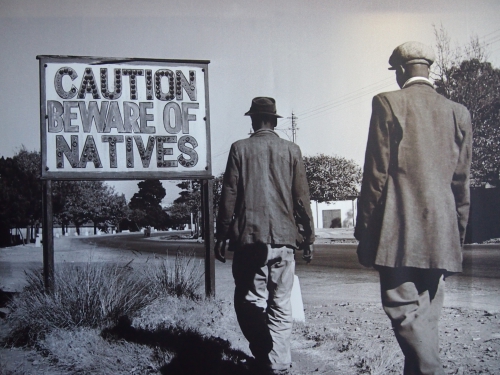cours semaine du 25 novembre.
Here are the lessons for this week. I will post the correction along with the new lessons next Tuesday.
You don't have to work on your own and are allowed to work with some friends in order to discuss or to divide the amount of work to do.
1) Describe the following picture.
2) Read the laws below. They were all implemented under the apartheid regime.
Use the grammar lessons on the following website to write what coloured people were allowed to do, what they were prohibited to do...
http://campus2.univ-lille2.fr/claroline/backends/download.php?url=L2dyYW1fYXV4X21vZGF1eC5wZGY%3D&cidReset=true&cidReq=AGRAMAUXMOD
SUBSTITUTS DE MODAUX
Be allowed to : permission indépendante de So
Should pregnant women be allowed to drink beer ? Compatible avec une modalité déontique
Be able to : capacité effective, situation spécifique majoritairement
At that time, she wasn't able to speak at all and she had very little movement in the right side of her body. Négation : privé d’une capacité (diff de non capacité).
Manage : capacité effective, obstacle franchi, situation spécifique
Yesterday, I couldn’t utter a word of English (avec négation, on reste dans le potentiel)
As a child I could speak Chinese (pas une situation spécifique, encore potentiel)
Yesterday, I *could, was able to , manage to speak English quite fluently
Have to : obligation indépendante de So
I don’t have to go now/ I don’t need to go now : non obligation qui ne dépend pas de moi
I must not go now : Interdiction que je prend en charge
Be going to : visée qui ne dépend pas d’une condition sous-jacente
Don’t sit on that chair, it will collapse (relation cause/conséquence)
Don’t sit on that chair, it’s going to collapse (il va s’effondrer de toute façon)
To do so use modal auxiliaries or equvalent structures .
Below are some of the laws enforced during the Apartheid, many which complet! ely disregarded human rights by denying non-whites a good education, the right to vote, and the right to own land, to name a few examples.
1949-Act No 55, Prohibition of Mixed Marriages Act:
Prohibited marriages between white people and non-white people.
1950- Act No 21, Immorality Amendment Act:
Prohibited adultery between white and non-white people.
1950- Act No 30, Population Registration Act:
Required every South African to be racially classified.
1950-Act No 41, Group Areas Act:
Forced separation between races through the creation of residential areas designated for certain races.
1950-Act No 44, Suppression of Communism Act:
Outlawed communism and the Community Party in South Africa. The definition of communism was very basic; it included anything the called for a radical change in how the government worked.
1951-Act No 27, Bantu Building Workers Act
Prevented black Africans from performing skilled work in any areas except those designated for black occupation.
1951-Act No 46, Separate Representation of Voters Act:
Led to the removal of Coloureds from the common voters' roll.
1951-Act No 52, Prevention of Illegal Squatting Act:
Gave the Minister of Native Affairs the ability to displace blacks from public and privately owned land and to place them in resettlement camps.
1951-Act No 68, Bantu Authorities Act:
Created black homelands, regional authorities and abolished the Native Representative Council. !
1952-Natives Laws Amendment Act:
Limited the amount of blacks who could have permanent residence in towns to those who had been born in a town and had lived or been employed there continuously for no less than 15 years.
1952-Act No 67, Natives (Abolition of Passes and Co-ordination of Documents) Act:
Forced black people to carry identification (which included a photograph, place of origin, employment record, tax payments, and encounters with the police) at all times.
1953-Native Labour (Settlement of Disputes) Act:
Prohibited black people to go on strike.
1953-Act No 47, Bantu Education Act:
Established a Black Education Department compiled a curriculum suited to the "nature and requirements of the black people". The aim of this law was to prevent black Africans from receiving an education that would allow them to work in positions that they were not allowed to hold under the previous Apartheid laws.1953-Act No 49, Reservation of Separate Amenities Act:
Enacted segregation in all public areas including buildings and public transport. 1956-Act
No 64, Natives (Prohibition of Interdicts) Act:
Denied black people the ability to appeal to the courts if they were forcefully removed.
1959-Act No 34, Bantu Investment Corporation Act:
Created financial, commercial, and industrial schemes in the areas designated for black people.
1959-Act 45, Extension of University Education Act:
Prevented black students from attending white Universities.
1959 -Act No 46, Promotion of Bantu Self-Government Act:
Classified black people into eight ethnic groups. Each group had a Commissioner-General who was appointed to create a homeland. In turn, each homeland would be able govern itself without white intervention.
1967-Terrorism Act:
Create BOSS, the Bureau of State Security which was responsible for the internal security of South Africa. It also allowed indefinite detention without trial.
1970-Bantu Homelands Citizens Act:
Removed black South African citizenship and required all black people to become a citizen of the homeland designated for his/her ethnic group.
